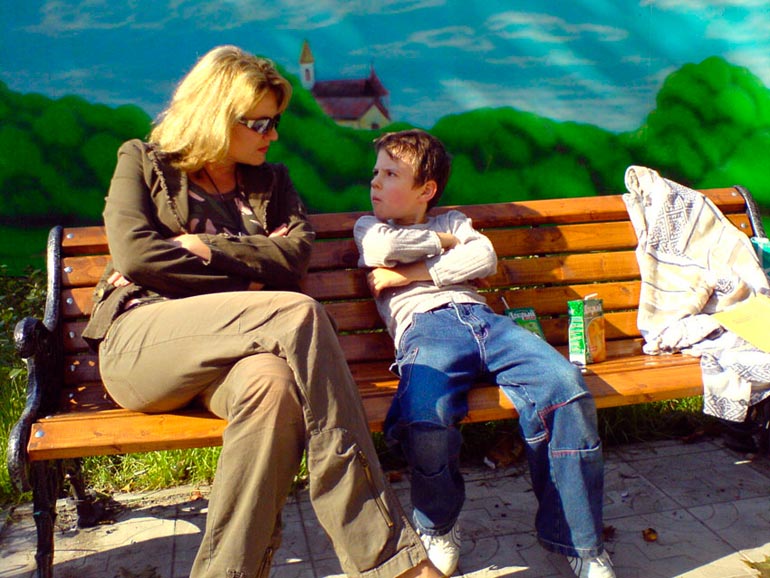Sometimes it is difficult for parents to find a common language with their children, so that communication with them turns into endless disputes and conflicts. Psychologists say that if you change the behavior of an adult in relation to the offspring, then a huge number of problems in education may not arise. How then to interact with the child in order to avoid numerous conflicts with parents and peers?

Active Listing Rules
Not always even a student can accurately express his feelings if he failed, quarreled with someone, was offended, tired, or when he was treated unfairly. What can we say about the preschooler! But such situations can cause conflicts and difficulties in interacting with peers. In this case, parents need to hear their child, show what they know about his problems, and help voice his experiences. In psychology, this method is called "active listening."
To return in conversation what the child told you, while indicating his feelings - this is actively listening to him. There are some basic rules communicating with children through active listening.
- Be sure to postpone all personal affairs when you want to chat with a child. Do not look at the TV, do not communicate in social networks, do not read the book - turn to face it. Do not look at the child from a height of its own height: if it is still small, take it to your hands or kneel down; if he is already a schoolboy, sit down next to him.
- Another powerful signal telling the child that you are ready to listen to him is eye contact. Your eyes must be on par with the eyes of the baby.
- If your offspring is upset, do not ask him questions. Let your response sound in the affirmative. For example, a child says in frustration: “I will never play with Seryozha!” Do not ask what happened or if he was offended by a friend. Simply answer: “I understand. You are offended by him. " Sorrowful children are overwhelmed with emotions that they cannot share. And the phrase question does not reflect your empathy. By voicing their feelings, you help to start a conversation.
- Repeat occasionally what you hear from the child, thereby confirming that you are attentive to him. Try to speak his feelings: “I understand, you hit Dima because he called you a name. You, of course, were very angry with him. ”
- Be sure to pause in the conversation with the child. A break in the conversation provides him with a good opportunity to understand his own mood and feelings and encourages more frankness.
READ ALSO: Little manipulators: how to respond to the tricks of the child? 10 most successful childhood phrases – https://kid.htgetrid.com/en/psihologiya-detey/malenkie-manipulyatoryi-kak-reagirovat-na-detskie-ulovki-10-naibolee-udachnyih-detskih-fraz.html
How to discuss the behavior of the child?
So, you listened to the child, but this does not mean at all that you have achieved a solution to the conflict. Through active listening, you just showed that you are not indifferent to his problems. Now you need to solve these same problems with behavior.
- Choose the right time to talk
Suppose you were informed about the conflict of your offspring with a classmate (classmate). Do not start a serious conversation when he is upset and tired came from school (kindergarten). Let him first rest, dine, and only then proceed to the conversation. If you yourself came back wrapped up (for example, from the parent meeting), take a break and switch to something else.
- Find the pros
Do you like to be criticized? So the children feel insulting and annoyed at the remarks. Nevertheless, it is necessary to criticize the wrong actions of the child. “Sweeten” your not-so-pleasant words with a small, if possible sincere praise. For example: “You have a wonderful voice, but you can’t sing at dinner in kindergarten”, “You are very good at handling the ball, but please play football not in the classroom, but on the field” or “I am glad that you are honest me. However, the next time you visit, ask me for permission. ”
- Suggest a choice
Why is the child so actively resisting your instructions? Psychologists answer: this is his natural tactic of upholding their own independence. To avoid conflicts, give the children a choice. For example: “What do you want for lunch: porridge or pasta?”, “Will you wash the dishes or take a walk with the dog?” or "Will you wear a dress yourself, or will you help with buttons?"
By giving your child a choice, you allow him to think and reflect on his own. The possibility of an alternative enhances children's self-esteem. At the same time, adults, on the one hand, retain control over the offspring's actions, and on the other, satisfy his need for independence.
- Ask the children to solve the problem.
 This unusual tactic is especially effective with primary school children, as they want more responsibility. Ask the child: “Honey, you spend a lot of time waking up and dressing in the morning. Because of this, you are almost late for the first lessons almost every day. Yes, and I do not have time to work. I think that something needs to be done with this. What solution can you offer? ”
This unusual tactic is especially effective with primary school children, as they want more responsibility. Ask the child: “Honey, you spend a lot of time waking up and dressing in the morning. Because of this, you are almost late for the first lessons almost every day. Yes, and I do not have time to work. I think that something needs to be done with this. What solution can you offer? ”
Such a question makes children feel responsible and adults. They understand that parents do not always have ready-made answers to any problem. Expect many offers from them!
- Tell us about your feelings.
Talk to your children about how you feel: “I am absolutely not happy with how you talk to me. Would you like to be yelled at? ” Children over five years old are literally captured by ideas of justice, so they will certainly understand your point of view, unless, of course, you say it in the heat of a quarrel. A calmed child is the most ardent defender and supporter of the golden principle: “Do as you wish to be treated with you.”
- Do not compare with other children
And most importantly - never (especially in frustrated feelings) do not compare your offspring with others, educated and exemplary in your opinion, peers. Your child has that special quality that distinguishes him from all other children. And if the need is ripe for comparison, do this by correlating his past behavior with the present.
Using a competent approach to communicating with children, adults can avoid quarrels and conflicts in the family and problems with peers. In any case, be sure to accept your favorite child as he is. Try to listen to his desires, to gently express your position, so you can not only solve, but also avoid conflicts as much as possible.
READ ALSO:
How to teach a child to apologize? – https://kid.htgetrid.com/en/psihologiya-detey/kak-nauchit-rebenka-izvinyatsya.html
- 15 signs that you are too strict on the child – https://kid.htgetrid.com/en/psihologiya-detey/15-priznakov-togo-chto-vyi-slishkom-strogi-k-rebenku.html
- 10 tips to stop yelling at your children – https://kid.htgetrid.com/en/psihologiya-detey/kak-perestat-krichat-na-svoih-detey.html
- 10 mistakes of parents in raising children – https://kid.htgetrid.com/en/psihologiya-detey/top-iz-10-oshibok-roditeley-v-vospitanii-detey.html
- 25 tips for raising a child in love and peace – https://kid.htgetrid.com/en/psihologiya-detey/25-sovetov-kak-vospitat-rebenka-v-lyubvi-i-spokoystvii.html
Mom's secrets. Conflict resolution with a child
How to be a wise parent-8. Five fundamental stones of education









In communication with mine, I use the carrot and stick method. Initially, I show him that he is an adult and can make his own decisions. But when he begins to bend showing him his authority, he obeys.
Here are the main mistakes that I made in my time in communication with my eldest son, and which I try so hard to avoid with my younger son. Probably the most important thing is to make it clear to the child that he is respected as a person! And you can make it clear in such a way that you do not hide your feelings from the child, have a dialogue with him on an equal footing, do not force him to do anything, but offer options or look for a solution yourself. When a child understands that his opinion and decision are put on a par with adults, then he will try to accept them correctly and responsibly!
If the child knows that at the meeting the class teacher will talk about his bad behavior, then he is waiting and worried. It seems to me that in this case it is wrong to postpone the conversation. Parents should calm down on the way home.